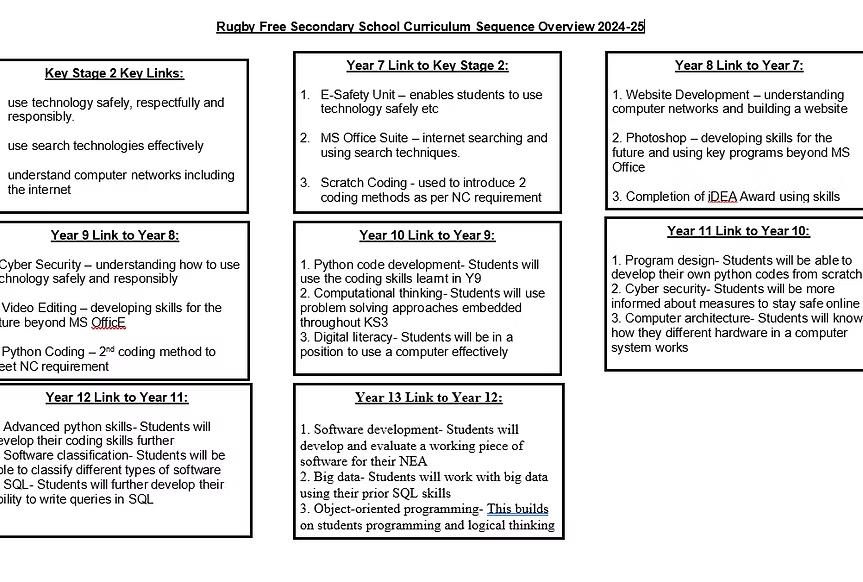Digital Communications -Computer Science
Computer Science recognises the well-established methodologies of computing, alongside the technological advances which make it such a dynamic subject.
Computer Science includes fresh features, including a programming exam to provide a programme of study for students of all ability levels.
Within computer science, students will develop logical thinking skills, and how to “think” like a computer. They will gain practical programming skills in python, one of the most common programming languages worldwide, the concepts of which can be applied to any programming language. They will also learn about the various job roles available for computer scientists in various industries, and begin to develop the skills they need for any of these careers that they may choose to pursue.
Digital Communication – Overarching Curriculum Intent (September 2025)
RFSS Curriculum Vision Statement:
To build an inclusive curriculum which is aspirational for all and empowers our students to make outstanding academic and personal progress.
Digital Communication Curriculum in Context:
Society is moving into the digital realm at pace, with the advent of AI, advanced programming and roles in the computer science industry increasingly in demand it is important we at RFSS provide a bedrock for our student to live and work in this new world. The students that attend RFSS face a number of challenges from high cost of living in Rugby, where 1 in 3 of our students live in deprived parts of the town and lots of our parents having limited experiences of higher education but conversely many of students are at the opposite end of that spectrum. We have built a curriculum that both bridges the gaps in student understanding of basic digital communication tools as well as developing the skills and attributes needed to be a success long term in the computing, business and media fields. Our curriculum must try to lay these foundations to ensure all student have the skills needed to live and work with the tools demanded by the creative industries and businesses around the world, if we are to provide a route out of depravation and expand our students’ horizons we need to encourage broader thinking in terms of opportunities and experiences beyond the boundaries of Rugby. Our curriculum must serve to provide student with even basic tools like MS Office but to also push beyond this into coding, AI and content creation. Our broad curriculum aims to meet these long-term requirements on citizens whilst enthusing and inspiring students to take up careers and interests in our subject suite.
Curriculum Aims:
-
Fully support students that are happy, healthy and safe in the modern world.
-
Provide support one-to-one to enable all levels of academic progress, ensure students maximise their ability and talent in our subjects to achieve both on a personal and academic level
-
We have an inclusive curriculum, designed to support learners of differing abilities from core to complex understanding clearly mapped.
-
Empower our students to know more, remember more and be able to do more:
-
Understand a range of programs and their features
-
Understand the language of computer science, media and business, using the technical language and key terms in our fields
-
Work independently, students will be provided with guidance and structures from skilled and knowledgeable staff to help them be creative as individuals
-
Inspire our students to strive for excellence and success throughout their lives:
-
We want students to develop their skills like acorns, to study our subjects at University, in Apprenticeships and in their careers as they become mighty Oaks
-
Challenge students to push beyond basic understanding and apply key skills in thinking and being creative
-
Prepare our students to be both digitally literate, aware of the environment in which their digital selves operate but also to create new content
Our broad and balanced curriculum concentrates on developing our students’ key knowledge and skills, and enhances their understanding of the world around them.
We do this by:
-
Stimulating intellectual curiosity and independence to explore ideas, programs and inspiring student’s creativity
-
Facilitating collaboration, students will share new techniques, be self-critical and supportive peers
-
Promoting challenge for all, irrespective of starting points by scaffolding knowledge and understanding allowing students to develop their skills and maximise their potential.
-
Enabling creativity, students have broad choices to develop their own pathway through united and interpretation of briefs.
-
Sequencing learning to ensure logical progression, both horizontally and vertically. Content and skills are revisited across the key stages and across our suite of subjects to develop confident learners
-
Revisiting previous learning, key vocabulary, ideas and concepts to support the transfer to long-term memory.
-
Ensuring our students are literate and confident using subject specific terminology in context, both showing understanding and being confident to converse in the language of computing, business and media
Our curriculum is focused on the development of communication, character and cultural capital of each individual student, so they become:
-
Empathetic citizens who contribute positively to society in a respectful manner, who understand the power of the tools we use and the responsibility they have to use these tools correctly
-
Reflective learners who are resilient enough to problem solve, reason, evaluate and debate as well as become critical of their outcomes to develop skills for the future.
-
Articulate individuals who can verbalise their own thoughts, ideas and emotions. We support creativity and encourage all to express their ideas regardless of starting points.
-
Hard-working and empathetic young people who are aware of how their learning links to real-world situations and can forge these links independently.
Curriculum Outcome:
As a consequence of our curriculum, students who leave RFSS will be equipped with the academic qualifications and personal qualities to progress into further education and employment. Our students will have a positive outlook and a commitment to achieving their personal best, being creative, enterprising and innovative through a love of life-long learning.

